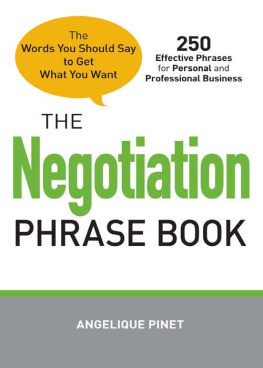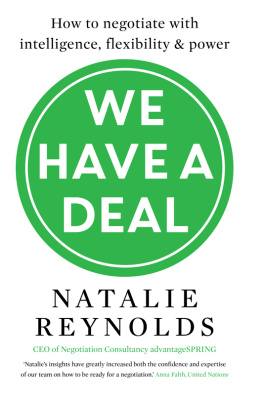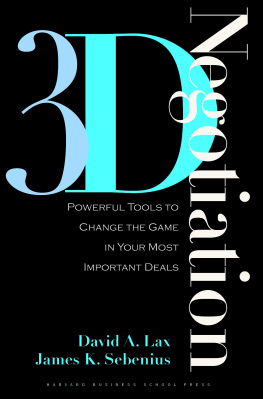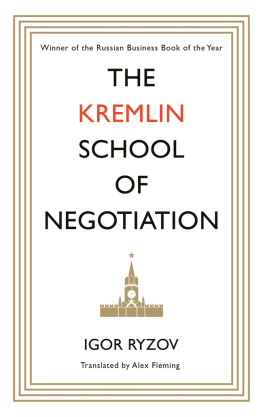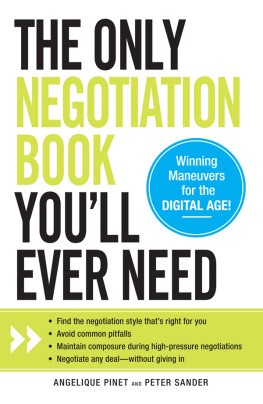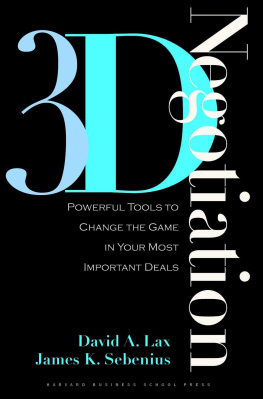________________________________________
The After-Deal
______
_________________________________________
The After-Deal
What Happens After You Close a Deal?
______
Eliane Karsaklian
University of Illinois at Chicago
INFORMATION AGE PUBLISHING, INC.
Charlotte, NC www.infoagepub.com
Library of Congress Cataloging-in-Publication Data
A CIP record for this book is available from the Library of Congress
http://www.loc.gov
ISBN: 978-1-64113-806-2 (Paperback)
978-1-64113-807-9 (Hardcover)
978-1-64113-808-6 (ebook)
Copyright 2019 Information Age Publishing Inc.
All rights reserved. No part of this publication may be reproduced, stored in a
retrieval system, or transmitted, in any form or by any means, electronic, mechanical,
photocopying, microfilming, recording or otherwise, without written permission
from the publisher.
Printed in the United States of America
Introduction
Do More Than Wish
You have just signed a deal. Congratulations! And now what?
You might say, now we get down to work.
This is when my main question comes in: How? How do you enforce a deal? How do you put into practice all of the terms outlined in your contract? How do you manage unexpected requests? And what if things dont go as smoothly as imagined in the deal?
And you thought that your negotiation was over when you got that deal signed? You wish!
You are just starting a long journey. You didnt close a deal. You opened the door to a new cooperation. You started a new life with someone else. This is the reality of negotiation. It doesnt finish when you sign a contract; it starts there.
If you are tired of failing in your negotiations and not knowing exactly why you failed them, and if you have had enough of wasting money with unfruitful relationships, this book is for you.
It Was a Phone Call; Not a Wedding
Most negotiators dont see their partners (or counterparts as they are awfully called) as people they want to be in a relationship with for long. They negotiate a deal for the short term. Then they switch to other partners and many others again, searching for the lowest price, or the trendy novelty, or a brand name as an endorsement. Nothing sustainable. Nothing deep. In the end, these companies are known as opportunistic and unreliable. Unstable people with whom one cannot envisage any future.
This is not what you want to be. You dont want to be the one who competes, closes the best deals for your company, and lets all the consequent issues pervade your relationships in such a way that you are always in search of other options. Have you ever thought about the costs of searching for new partners all the time? What you save in getting the lowest price in some deals, you spend in recruiting new partners later on.
If you think short term, short term is all you will get. Dont expect to get sustainable results from short term deals. Rather, you need to think about the future. Your future, the future of your company which wont be what you want it to be alone. If you want your company to be around for long, you need to aim at sustainable growth.
In international business, no company can reach sustainable growth alone. You need to get the right partners for that. Get married to the right people. Couple with people who can help you to go the distance. You need them and they need you for their own growth.
They might be far away. They might be in countries youve never been before, speak a different language, and have different habits. You need to learn how to talk with them. You need to see your future together across countries, cultures, and markets. You need to open up to sustainability with no boundaries.
If you want to be successful you need to have your goals very clear. If you are unclear youll be lost in the mist of average companies. Remember that a contract is just theory on a piece of paper. Reality hits when you enforce the contract. Focus on your goals with magnifying lenses. When things get tough your purpose for the future will keep you focused and push you to overcome adversity. Your energy comes from your purpose and makes you grow.
People With Accents Should Speak Slowly
I came across this quote in a book about negotiation. My first thought was, What? My second thought was, But who doesnt have an accent? My third thought was, You mean that every single person in the world should speak slowly?
This is just one more example of people who talk about negotiation having no idea of what international negotiation or international business in general is about. Of course, this author meant foreign negotiators in his country, but his comment just showed how culturally unaware he was. Ever since English became the international language for business, all we have in business settings is different accents from people from diverse countries. Interacting with different accents is just a daily practice for people working internationally. Get used to that.
It reminded me of a person who once told me that at the beginning of my talks, I should give people time to get used to my accent. My reply was, How much time do you think we are given to get used to all the different accents at the table of negotiations? And this person sells herself as a coach in business development! Or as someone else once told me, Its not because I have an accent that I dont know my stuff.
No wonder businesspeople fail in international settings when following such advice. People who have no international experience and knowledge should not give advice about international business. People who are not interculturalists should not tell others how to interact with other cultures.
Culture has become both a practice and an issue in international business. A practice, because, well, business is practiced internationally today; and an issue, because all that is said about working across cultures seems to be problematic. Some people are making money just telling others how to work with the Chinese, or the Indians, or with any other mysterious culture in the world in one single training day. As if we could learn about other cultures in one day.
But we certainly forgot that international business is nothing new. In the old times, we had already interacted across cultures, learned and inherited from each other. We learned about the stars with the Babylonians, have paper to write on thanks to the Chinese, and count with numbers created by the Indians.
The Chinese had already understood magnetism and created the compass while practicing traditional Chinese medicine based on herbs which are now used in the Western world. Egyptians had advanced surgical tools enabling them to extract the main body organs from pharaohs before mummifying them. Indians practiced eye surgery in eliminating cataracts. And the most famous atomist was Democritus in Greece.
The first international negotiators in the world were the Phoenicians, sailing back and forth around the Mediterranean Sea, buying and selling products from all countries. India and China were part of a vast overland and overseas trading networks channeled along the spice routes. And their people had developed writing and science to a high level. Science benefited trade and the wealth from trade allowed study. So, science and international negotiation have been interconnected ever since.
Science is the best way of finding out about the world and everything in it, which includes us. For most of human history, science has been used alongside magic, religion, and technology to try to understand and control the world. Today, we aim at separating science from all irrational practices. What was compatible before is made incompatible now. First, Descartes asserted that body and soul where two separate and disconnected things. Then there were theories about intelligence quotient, more often called IQ, which aimed at measuring (rationally) peoples ability to think and analyze. Then it was discovered that humans have more than one type of intelligence and new theories came up. Today we talk about emotional intelligence which is the ability to identify others emotions and respond accordingly, and cultural intelligence (CQ) which is the ability of knowing and understanding other cultures and behaving accordingly.



